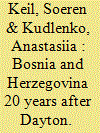| Srl | Item |
| 1 |
ID:
142274


|
|
|
|
|
| Summary/Abstract |
This article will start with an analysis of the Dayton Peace Agreement, and assess to what extent it focused on peace-building, state-reconstruction and democratization. It will provide an overview of major peace-building, state-reconstruction and democratization initiatives by international and local actors in post-war Bosnia. Following the often-presented argument that ‘Dayton is a good peace agreement but a bad blueprint for a democratic state’, the article will ask if the Dayton Peace Agreement has failed in the consolidation of Bosnian statehood and the democratization of the country. In order to do this, an in-depth analysis of the current situation in terms of state consolidation and democratization will be given. The main argument of the article demonstrates that while the Dayton Agreement had some inherent weaknesses, actions by local elites and international state-builders also explain some of the current issues of the Bosnian state.
|
|
|
|
|
|
|
|
|
|
|
|
|
|
|
|
| 2 |
ID:
192527


|
|
|
|
|
| Summary/Abstract |
When Russia launched a full-scale invasion of Ukraine on February 24, 2022, Ukrainians did not crumble under the unprecedented attack but showed steely resolve to fight for independence and the right to decide their own fate. In the Western media and scholarly analysis, the Ukrainian resilience is often associated with the leadership of the state, in particular President Zelensky. This article offers a different take on the issue of resilience in war and looks at the value foundations of Ukrainian identity, the decentralized nature of Ukrainian society and the vision of a better future as part of the Euro-Atlantic community to better understand Ukraine’s agency in response to Russia’s invasion. It draws on the original data, collected from interviews of three categories of Ukrainians, affected by the war: refugees, internally displaced people, and those living close to the frontlines.
|
|
|
|
|
|
|
|
|
|
|
|
|
|
|
|